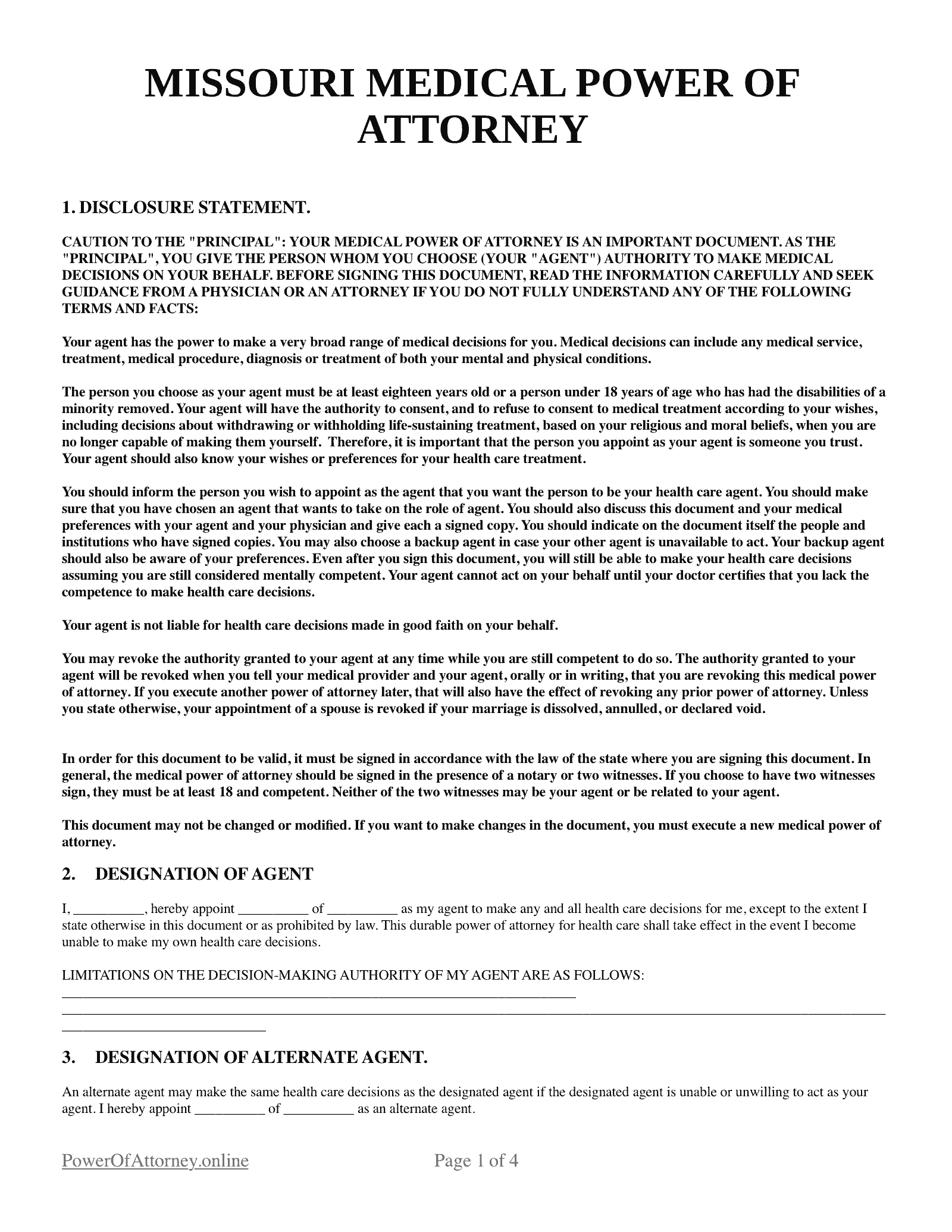Free Missouri Medical Power of Attorney Forms
The Missouri Medical Power of Attorney (MPOA) is a crucial legal document that enables an individual, known as the “principal,” to authorize another person, referred to as the “agent,” to make healthcare decisions for them.
As principal, this would be used in the event you become incompetent and unable to express your medical preferences, which can give you peace of mind knowing your wishes will be respected.

Missouri Medical Power of Attorney Laws
Missouri law provides clear guidelines on the use and requirements of a Medical Power of Attorney.
This document can be used if you become incapacitated. Below is a definition that explains how the term “incapacitated” is defined by Missouri law:
- Incapacitated definition: “a person who is unable by reason of any physical or mental condition to receive and evaluate information or to communicate decisions to such an extent that he lacks capacity to meet essential requirements for food, clothing, shelter, safety or other care such that serious physical injury, illness or disease is likely to occur” (§404.805).
Signing Requirements in Missouri
To ensure your Medical Power of Attorney form is legally recognized in Missouri, you must adhere to the specific signing requirements dictated by state law.
- Signing requirements: You must sign your MPOA document must be signed in the presence of a notary public. (§ 404.705(3))
Additionally, 2 individuals at least 18 years of age and not listed on the MPOA will need to witness the signature if someone signs a healthcare definition in your place.
If you are making a declaration yourself then signing with 2 additional witnesses is optional. (§459.015).
How to Write a Medical POA in Missouri
Creating a detailed Missouri MPOA requires careful attention to detail and an understanding of the state's requirements.
Follow the steps below to correctly create a well-structured Missouri Medical Power of Attorney.
1. Select an agent or agents
Your chosen agent will be responsible for making essential medical decisions on your behalf. It's imperative to designate someone who respects and understands your medical wishes.
It’s also not a bad idea to appoint a secondary agent in case your primary agent is unable or unwilling to make decisions when required.
2. Engage in a conversation with potential agents:
Before adding the agent’s responsibilities to your Medical Power of Attorney, have an open dialogue with your chosen agent(s).
Have a chat about your medical values, specific wishes, and any other relevant concerns. This ensures that your agent is both comfortable with their role and fully aware of its importance.
3. Use a Missouri-specific MPOA template:
Drafting an MPOA can be simplified using an MPOA template tailored to Missouri's requirements.
Our printable template allows you to adjust the document to include all of your healthcare preferences. By doing so you can quickly create your document and avoid paying large legal prices.
4. Detail the agent's powers:
Clarify the particular powers you're granting to your agent. This can span from broad medical decisions to specific tasks such as:
- Deciding on surgical options
- Accessing medical records
- Making end-of-life choices
- Opting for or declining certain treatments
The more clear your instructions are, the more accurately your agent who acts on your behalf can follow through on your wishes.
5. Address compensation considerations (if relevant)
While some agents, particularly close friends or family, may not expect compensation, it's crucial to talk this subject over. If you decide to pay your agent, specify all the details in the MPOA.
Otherwise, state that the agent will only receive reimbursement for any necessary out-of-pocket expenses.
6. Sign the MPOA in front of a notary
Once all of your terms and the agent’s powers have been added, you must sign the document.
For your MPOA to be legally valid in Missouri, you must sign it in front of a notary public and 2 witnesses of legal age not named in the document.
If you fail to do so, your document will not be considered legally valid, which means your medical wishes may not be followed.